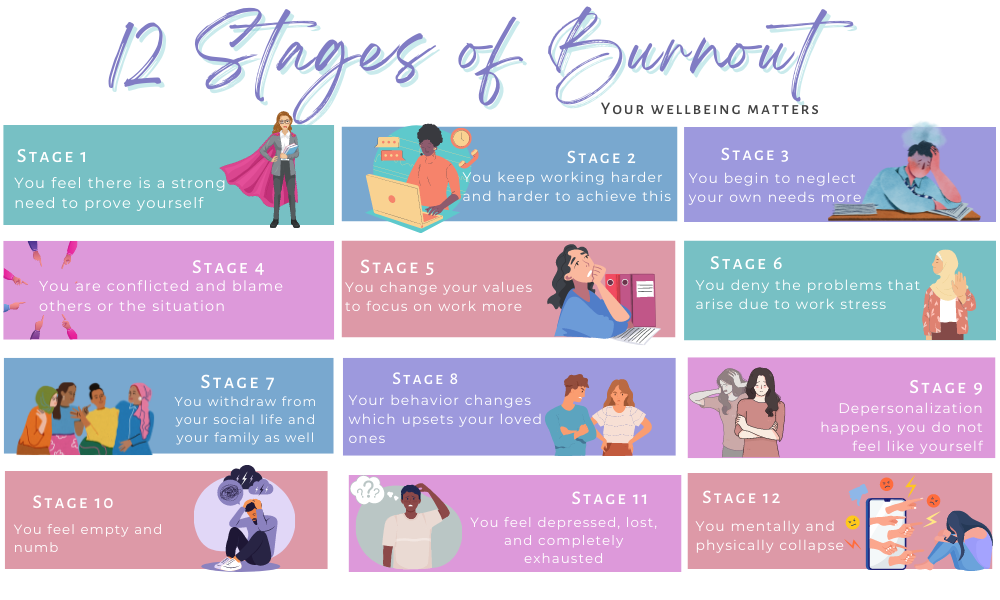If you’re at any stage of burnout in your own life, know that you are not alone. Whether you’re at stage one or stage nine or stage 12, it’s okay to take time for yourself, to prioritize your needs, and to put yourself first. Your mental health matters and YOU matter.

In the Wellbeing Elixir course, you’ll cover an array of strategies and research to help you find joy in your job, yourself, and the world around you. The following techniques and tips are merely a glimpse at what the Wellbeing Elixir has to offer.
Our challenging seasons
“It is our most challenging seasons that serve as our greatest teachers.”
If you’re in a challenging season, who is on your pit crew of support? Who is your:
| Cheerleader | The person who helps pick you up when you’re feeling down. |
| Challenger | This person is not afraid to tell you like it is. They often provide a new point of view—sometimes their advice can be uncomfortably honest. |
| Comfort zone crusher ♀ | Who gets you out of your comfort zone? The TSN (Try-Something-New) friend. |
| Motivator | Is there someone who may be ahead of you in terms of goals, but they inspire you because they show you what is possible? |
| Safe space friend | This person makes you feel comfortable, always makes you laugh, and is there to lend an ear to listen. |
All of the people on your crew—hand selected by you—are here to help. Also, remember to practice active optimism during your challenging seasons. This is where you challenge your negative thoughts and move toward productive action—oftentimes your pit crew can help.
Finding the positive
Positivity isn’t always easy to see or to find in a difficult situation. Perhaps you didn’t get the job, or your class activity that you spent weeks preparing for didn’t go well, or maybe you were late to a department meeting and you now have 50 emails awaiting your response…
When your emotions are positive, the burdens of your circumstances become lighter, and you can more readily see the opportunities and resources available to you. The Happiness Advantage can help you see the importance of positive emotions.
The Happiness Advantage :
- Ninety percent of your long-term happiness is predicted by the way your brain processes the world.
- Consider what your perspective is on a difficult situation.
- Seventy-five percent of job success is predicted by optimism level, social support, and the ability to see stress as a challenge instead of a threat.
- Your brain at positive is 31% more productive than at negative, neutral, or stressed.
- Check out Shawn Achor’s TED Talk, “The Happiness Advantage: Linking Positive Brains to Performance” for more information on the Happiness Advantage.
So, what does this mean? This means if happiness is on the other side of success, your brain never gets there. “I got good grades. I need better grades.” If you can raise your positivity or someone else’s positivity in the present, your brain experiences the happiness advantage—it performs better, your creativity rises, and your energy rises.
How can you find the positive?

- Find three new things you’re grateful for every day
- Scan for the positive first and train your brain to find the positive
- Journal
- Exercise
- Meditate so you can focus on the task at hand
- Free meditation apps: Headspace, Wellbeing Elixir guided meditations
- Perform a random act of kindness
- Create a gratitude board with a new prompt or theme every month
Mindfulness vs Mindlessness: Where are your thoughts?
Mindfulness is paying attention to something on purpose. You are nonjudgmental and aware without judgement. You are present in the moment and your thoughts are not dwelling on the past or future.
On the contrary, mindlessness can take shape when you’re in a meeting and you zone out. You may mindlessly eat an entire bag of chips. Mindlessness often leads to automatic behaviors. You may automatically respond to certain events or experiences rather than taking a pause, understanding the stimulus, and thinking about what you want your response to be.
But, thinking about what you want your response to be can be tricky! Often, we tell ourselves negative thought stories—we catastrophize and go well beyond one experience as if it explains everything. “It happened once, surely it will happen again and worse.”
Here are a few ways to help with your negative thought stories:
- Concentrate on an anchor. A common anchor is often your breath. By anchoring your thoughts to your breath, you can notice when your mind wanders off and what it wanders off to. When it begins to wander, move your mind back to your breath.
- Let it be. Be an observer of it. Once we observe it, savor the good and let go of the anger and self-doubt. Acknowledge that it exists but know that there are other ways to think about it.
- Become absorbed in an activity. Read a book, do a puzzle, start a woodworking project, or go for a walk/run.
- Take a break! Your energy often wains in the afternoon. Aim for three small breaks per a day.
- Take a walk
- Take a social break
- Reach out to someone to connect with
- Write a letter or note of gratitude
- Do a short-controlled breathing exercise
Turn your ANTs (Automatic Negative Thoughts) into PETs (Positive Empowering Thoughts)
Transforming your negative self-talk is not easy. You might say, “I screwed up that project. It was terrible and it went all wrong.” Switch to, “I didn’t do as well as I wanted but that’s okay. Next time I know what I need to do to make it better.”
Our self-talk has a big influence on how we see ourselves and the world around us. Positive self-talk is extremely important, and changing the way you talk to yourself can reduce stress and anxiety.
Maybe you had a day where it didn’t quite meet your expectations, or you felt as if you let others or yourself down. Write yourself a self-compassion letter. In this letter, forgive yourself and remind yourself that those things are in the past. Reread your self-compassion letter when needed in the future.
Additionally, self-efficacy is extremely important in determining your productivity, your purpose, and your sense of agency, which can all impact your self-talk. Self-efficacy means you have the willingness to act and achieve goals. This can empower you and empower your overall purpose. Although your purpose will naturally wax and wane and shift and morph throughout your life, your purpose is not a destination but a journey and a practice.
Ask yourself:
- Is there a problem or challenge that emotionally moves you to take action?
- What kind of work would give you a sense of satisfaction or fulfillment?
- What kind of work feels effortless to you and drives your curiosity to learn more?
The power of visualization
The beauty of visualization is that you can practice new patterns and actions in your mind without fear of failure in the physical world. Visualization allows you to make multiple attempts to get it right before even trying it. By trying alternatives and correcting mistakes during visualization, you are programming your mind to help you overcome obstacles.
Create a vision board:

- Who do you want to be in 10 years?
- Imagine the healthiest and happiest version of yourself. What do you feel and see?
- What are 10 dreams that would make your vision a reality?
- Write down those 10 dreams in a notebook as if they have already happened.
- Pick one to focus on as a goal. When it becomes a reality, move to the next.
Visualization exercise: Put an alarm on your phone and place yourself in a “scene” pertaining to a goal from your vision board several times a day. Integrate the feeling of this imagined “current” reality into your day and night, and it will blend into who you are. It will inevitability grow more and more natural and “evident” to your brain. This desired reality will increasingly feel as if it is already your reality—all you need to do is step into it!


